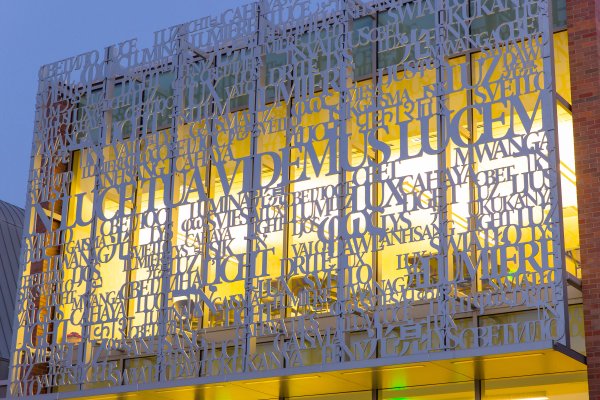Neuroscience (minor)
An understanding of the mind is one of the most important and fascinating human quests. For those who want to join this important endeavor, the neuroscience minor offers an interdisciplinary perspective on the structure and function of the human nervous system and the mental abilities that depend upon its operation.
The Neuroscience Minor
Neuroscience is a central topic of contemporary scientific inquiry, with many large research initiatives underway in the United States and international settings. It is an exciting field that attempts to study the basic structure and characteristics of human mental processes; the anatomy and physiology of the nervous system; and how mental and physical processes relate to each other. The field of neuroscience is both fascinating and complex, as it draws on insights from many different fields including bioengineering, cognitive science, computer science, experimental and clinical psychology, linguistics, and philosophy.
Students entering many research and professional careers, including artificial intelligence, clinical neuropsychology, medicine (especially neurology and psychiatry), neurolinguistics, and philosophy (especially philosophy of mind), will find a background in neuroscience to be helpful or even essential. Integral to the program is a set of learning objectives that orient faculty and students toward the acquisition of critical knowledge and skills necessary for understanding, appreciating, and using the tools of modern neuroscience.
A minimum of 16 credit hours is required for the minor in neuroscience.
| Minor Requirements for Forensic Science | ||
| Core Courses | 10 credits | |
| BIO 370 | Human Neuropsychology | 3 credits |
| Take four credits of the following course: | 4 credits | |
| NSCI 393 | Neuroscience Seminar | 2 credits |
| Elective Courses | 6 credits | |
| Choose 6 credits from two different departments from the following options: | ||
| BIO 380 | Principles of Human Physiology | 3 credits |
| BIO 493 | Seminar in Biology (with committee approval) | 1 credit |
| ENGL 343 | Introduction to Linguistics | 3 credits |
| PHIL 315 | Philosophy of Mind and Language | 3 credits |
| PSY 245 | Physiological Psychology | 3 credits |
| PSY 345 | Sensation and Perception | 3 credits |
| PSY 346 | Laboratory in Sensation and Perception | 1 credit |
| PSY 350 | Cognitive Psychology | 3 credits |
| PSY 351 | Laboratory in Human Cognition | 1 credit |
| PSY 376 | Laboratory in Neuropsychology | 1 credit |
| Capstone Course | 0-1 credit | |
| NSCI 499 | Neuroscience Capstone Project | 0-1 credit |
| Core classes should be completed during the sophomore or junior year if possible, while electives may be taken at any time. The capstone experience will usually be taken in the senior year. Prerequisite courses are required prior to registration in core classes and are typically completed during the freshman or sophomore year of study. In addition, the core program courses require a significant background in the biological and psychological sciences to allow full engagement with the technical aspects of neuroscience. Students are encouraged to consult with a neuroscience advisor to assist in selecting courses that will support their professional goals. | ||
Administrative Committee
Kieth Carlson
Professor of Psychology
Tel: 219.464.5442
Email: kieth.carlson@valpo.edu
Jim Nelson (coordinator)
Professor of Psychology
Tel: 219.464.5440
Email: jim.nelson@valpo.edu
Beth Scaglione Sewell
Professor of Biology
Tel: 219.464.5390
Email: beth.scaglionesewell@valpo.edu
Salena Anderson
Associate Professor of English
Tel: 219.464.5219
Email: salena.anderson@valpo.edu
Michael Glass
Associate Professor of Computing and Information Sciences
Tel: 219.464.5161
Email: michael.glass@valpo.edu
Andrew Butler
Assistant Professor of Psychology
Tel: 219.464.5441
Email: andrew.butler@valpo.edu
Reva Johnson
Assistant Professor of Mechanical Engineering and Bioengineering
Tel: 219.464.6541
Email: reva.johnson@valpo.edu
